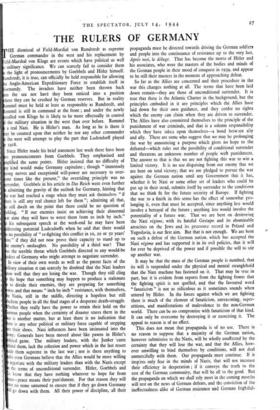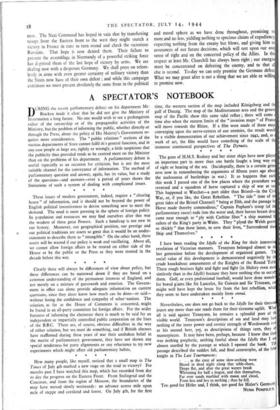THE RULERS OF GERMANY
HE dismissal of Field-Marshal von Rundstedt as supreme German commander in the west and his replacement by ield-Marshal von Kluge are events which have political as well s military significance. We can scarcely fail to consider them the light of pronouncements by Goebbels and Hitler himself. undstedt, it is true, can officially be held responsible for allowing e Anglo-American Expeditionary Force to establish itself in ormandy. The invaders have neither been thrown back to the sea nor have they been enticed into a position here they can be crushed by German reserves. But in reality ommel must be held at least as responsible as Rundstedt, and ommel is still in command at the front ; and under the newly stalled von Kluge he is likely to be more effectually in control the military situation in the west than ever before. Rommel a real Nazi. He is Hitler's man. As long as he is there it ay be counted upon that neither he nor any other commander the west will attempt to play the part that Ludendorff played 1918.
Since Hitler made his brief statement last week there have been o pronouncements from Goebbels. They emphasised and plified the same points. Hitler insisted that no difficulty of v kind would make Germany capitulate ; though "immensely ong nerves and exceptional will-power are necessary to over- me times like the present," the overriding principle was no rrender. Goebbels in his article in Das Reich went even further admitting the gravity of the outlook for Germany, hinting that e war had reached a stage when they must ask themselves "if ere is still any real chance left for them "; admitting all that, e still dwelt on the point that there could be no question of !ding. "If our enemies insist on achieving their abnormal ar aims they will have to wrest them from us inch by inch." his subsequent speech at the week-end he may have been dressing potential Ludendorffs when he said that there would no possibility of "re-fighting this conflict in to, 20 or 50 years' me" if they did not now prove their capacity to stand up to enemy's onslaughts. No possibility of a third war! That as the terrible threat which Goebbels directed to any would-be aders of Germany who might attempt to negotiate surrender.
In view of their own words as well as the patent facts of the ilitary situation it can scarcely be doubted that the Nazi leaders ow well that they are losing the war. Though they still cling the hope that something may happen to produce a stalemate to divide their enemies, they are preparing for something orse, and that means "inch by inch" resistance, with themselves, e Nazis, still in the saddle, directing a hopeless but still dient people in all the final stages of a desperate death-struggle. hether they really have the power to retain their hold on the erman people when the certainty of disaster stares them in the ce is another matter, but at least there is no indication that ere is any other political or military force capable of stepping o their shoes. Nazi influences have been insinuated into the mY; Generals have been moved about like pawns in Hitler's meal game. The military leaders, with the Junker 'caste hind them, lack the cohesion and power which in the last resort ade them supreme in the last war ; nor is there anything to ke even Germans believe that the Allies would be more willing negotiate with the military leaders than with the Nazis except the terms of unconditional surrender. Hitler, Goebbels and • know that they have nothing whatever to hope for from ce—peace means their punishment. For that reason they will ve no stone unturned to ensure that if they go down Germany I go down with them. All their power of discipline, all their propaganda must be directed towards driving the German soldiers and people into the continuance of resistance up to the very last. Apres moi, le deluge. That has become the motto of Hitler and his associates, who were the masters of the bodies and minds of the German people in their mood of conquest in 1939, and appear to be still their masters in the moment of approaching defeat.
So far as the Allies are concerned and their procedure in the war this changes nothing at all. The terms that have been laid down remain—they are those of unconditional surrender. It is true that there is the Atlantic Charter in the background, but the principles embodied in it are principles which the Allies have laid down for their own guidance, and they confer no rights which the enemy can claim when they are driven to surrender. The Allies have also committed themselves to the principle of the punishment of war criminals, and that is a solemn responsibility which they have takea upon themselves—a bond between ally and ally. There are some who suggest that we may be prolonging the war by announcing a purpose which gives no hope to the defeated—which rules out the possibility of conditional surrender and threatens an unknown number of people with punishment. The answer to that is that we are not fighting this war to win a limited victory. It is no use disguising from our enemy that we are bent on total victory; that we are pledged to pursue the war against the German nation until any Government that it has, whether it be Nazi or some other set of leaders who could be put up in their stead, submits itself by surrender to the conditions that we think fit for the future security of Europe. If fighting the war to a finish in this sense has the effect of somewhat pro- longing it, even that must be accepted, since anything less would involve a betrayal of the future ; anything less would involve the potentiality of a future war. That we are bent on destroying the Nazi regime, with its hateful Gestapo and its abominable atrocities on the Jews and its gruesome record in Poland and Yugoslavia, is our first aim. But that is not enough. We are bent on such a defeat of the German nation, which has accepted the Nazi regime and has supported it in its evil policies, that it will for ever be deprived of the power and if possible the will to stir up another war.
It may be that the mass of the German people is numbed, that its will is suspended under the physical and mental stranglehold that the Nazi machine has fastened on it. That may be true in part, but it is evident from reports from the fighting fronts that the fighting spirit is not quelled, and that the favoured word " fanaticism " is not as ridiculous as it sometimes sounds when uttered by Hitler. In the forces against which we are fighting there is much of the element of fanaticism, unreasoning, super- stitions, and manifestations of malevolence to the non-German world. There can be no compromise with fanaticism of that kind. It can only be overcome by destroying it or exorcising it. The appeal to reason is of no effect.
This does not mean that propaganda is of no use. There is no reason to suppose that a majority of the German nation, however submissive to the Nazis, will be wholly unaffected by the certainty that they will lose the war, and that the Allies, how- ever unwilling to bind themselves by conditions, will not deal unmercifully with them. Our propaganda must continue. If it inspires only fear in the minds of Nazis, that will not increase their efficiency in desperation ; if it conveys the truth to the rest of the German community, that will be all to the good. But the propaganda on which we shall rely most in the coming months will rest on the news of German defeats, and the conviction of the ineffectualness alike of German resistance and German frightful- ness. The Nazi Command has hoped in vain that by transferring troops front the Eastern front to the west they might snatch a victory in France in time to turn round and check the victorious Russians. That hope is now denied them. Their failure to prevent the assemblage in Normandy of a powerful striking force has d::prived them of the last hope of victory by arms. We are dealing now with a desperate Germany. We shall press on relent- lessly in arms with even greater certainty of military victory than the Nazis now have of their own defeat ; and while this campaign continues we must present absolutely the same front in the political
and moral sphere as we have done throughout, promising n more and no less, yielding nothing to specious claims of expediency expecting nothing from the enemy but blows, and giving him no assurances of our future decisions, which will rest upon our own sense of right and on the concerted policy of the Allies. In this respect at least Mr. Churchill has always been right ; our energies must be concentrated on defeating the enemy, and to that a else is second. To-day we can only promise the Germans defeat What we may grant after is not a thing that we are able or willin to promise now.



























 Previous page
Previous page